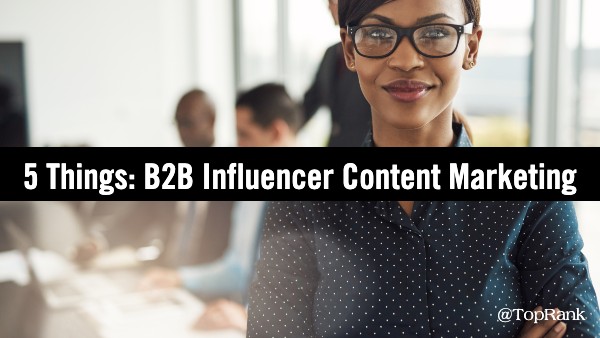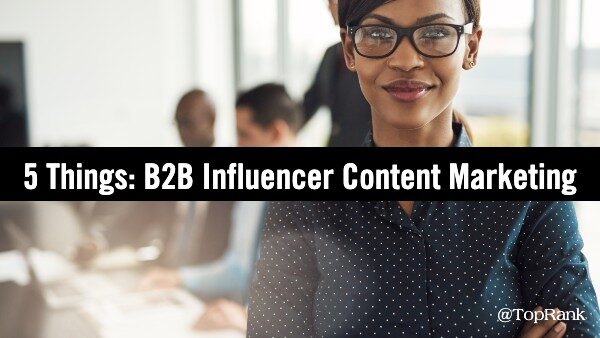
Given the rapid increase in influencer engagement amongst B2B brands over the past year, the opportunity and impact from working with influencers has become clear, especially with influencer content marketing according to the B2BIMReport:
- Results – 63% of B2B marketers agree that marketing would have better results if it included an influencer marketing program.
- Always-On Wins – 12X more marketers who run alway-on influencer marketing programs are very successful vs those running periodic campaigns.
- Impact on CX – 74% of B2B marketers agree that influencer marketing improves customer and prospect experience with the brand.
1. B2B Content Influencer Marketing defined:
The practice of engaging internal and industry experts with active networks to collaborate on content in a way that drives mutual value and helps achieve measurable business goals.
2. How to Engage B2B Influencers for Content
Most influencer engagements in B2B are organic where the value exchange is a trade of content, insight or promotion for the exposure that comes from being a part of the brand campaign. The best B2B brand and influencer relationships create mutual value and can do as much to build the profile of the influencer as it does to build brand reach with hard to reach audiences of interest.
To understand the different types of influencer engagement, it’s important to understand there are different types of influencers. That means there are different use cases for engaging influencers such as:
- A B2B brand comms team might engage with an analyst level influencer to produce original research.
- A B2B demand gen team might engage with a mix of practitioner influencers to collaborate on content for a campaign involving blog posts, an ebook, livestream video, podcast, social graphics, webinar – you get the idea.
- A B2B ABM effort might identify influential voices from a B2B brand’s prospect database and invite them to collaborate on content in a way that warms up engagement and drives sales conversations
For more on B2B influencer engagement, here are 25 B2B Influencer Marketing Campaign & Engagement Ideas.
3. Where to Start with Influencer Content Marketing
It’s important to understand what topics the brand wants to be influential about – that also matter to customers. Then the task is to find the right influencers about those topics. You can use a tool like Traackr and others that serve as a sort of search engine for influencers as well as an influencer CRM and analytics platform.
From a process standpoint I’d recommend getting help to do a pilot. That test can provide numerous insights into how well an influencer program could work for a brand – plus it could deliver on some marketing KPIs from the start.
Once a strategy, content framework, topic focus and influencer candidates are identified, the pilot can provide important learnings about how influencer engagement can optimize a B2B content marketing program. From there, process and software in combination with an Always-On approach can help turn those initial efforts into a scalable influencer program.
4. B2B Influencer Content Marketing in Action
SAP is a Fortune 500 company with dozens of business units, each one serving a distinct audience. Challenged to create a single influential marketing resource to reach multiple business objectives, SAP needed to implement an influencer content marketing process that would enable them to create a destination to satisfy the interests of business leaders within many verticals and topics around technology.
The solution included creating a podcast featuring an influencer host and a combination of industry experts and internal executives. To make the solution scalable, a process was developed and aided by multiple tools to identify, engage and activate influencers, record interviews, produce podcast episodes, publish and promote the podcasts.
Each business unit contributed discussion topics and identified internal experts to add to the influencer content. TopRank Marketing created a content map for each episode to make sure it aligned with brand messaging and the season’s central themes. This map informed the influencer questions and host segments, making each episode part of a larger, cohesive whole.
This approach allowed for faster, more efficient production, with episodes released on time and under budget. Not only that, the content itself was richer, with multiple influencers per episode, and a topic-based, storytelling format that proved more engaging than a traditional interview-format podcast. By operationalizing the podcast production, SAP was able to coordinate multiple influencers across business units, creating an engaging podcast season that sparked a powerful audience response.
- Six 15-30 minute podcast episodes
- 128M in potential reach from influencer shares
- 13M+ estimated impressions
- 66% increase in podcast downloads over previous season
Check out the campaign creative assets and full case study.
5. What Not to Do When Collaborating with B2B Influencers on Content
After working with B2B brands on influencer content marketing campaigns and ongoing programs for the past 9 years, we’ve learned many best practices and also what not to do. Here are a few things that can sabotage your B2B influencer marketing efforts (so avoid them).
- Wait to recruit – You don’t recruit an army on the first day of the war. B2B influencer marketing is a relationship business and building those connections takes time. Unless a B2B brand works with an agency that already has relationships with top influencers (like TopRank Marketing) it will be important to start develop relationships with potential influencers long before they are activated for a marketing campaign.
- Believing the hype of popularity – In the world of B2B marketing, relevance trumps popularity. Big follower counts can be misleading and do not always represent the value an influencer can bring to a B2B marketing effort. Big names and big fan counts are useful for getting broad attention, but not for middle or end of funnel outcomes.
- Going it alone – B2B marketers that are successful in other areas often believe they can crack the influencer marketing nut on their own. Not getting expert help with influencer program development and recruiting (if it doesn’t exist internally) can be very time consuming and frustrating. 60% of B2B marketers reported not implementing influencer marketing because they don’t have the resources or competency to execute internally. That’s why specialists like TopRank Marketing with established processes, influencer relationships and deep experience can play an important role in helping B2B brands hit the ground running.
- Mismatching content – A person’s influence is specific to topics, content types and channels, so when B2B marketers try to have a podcaster do live video or write blog posts, it’s not always a good match. Not because the influencer cannot create in other formats, but it’s not what they are known for or optimized for.
- Transactional approach – B2B marketers that treat influencer collaboration like an ad buy are making the mistake of applying rules and behaviors that are not appropriate for a relationship business. Think less about being transactional (we give you money or exposure and you give us content) and more about being inspirational. Creating a great influencer experience means communicating a vision for being a part of something that is relevant, compelling and bigger than just the individuals involved.
- Failure to communicate effectively – Relevant, timely, reasonable expectations, respect, thoughtfulness and appreciation are all essential characteristics of effective B2B brand and influencer communications.
Most B2B marketers have had to pivot during the pandemic and the good news is that many of the new go to market models have worked as well or better than pre-pandemic. The digital transformation of B2B over the past year has effected marketing as much as any other aspect of the business. Those changes include the growing importance of relationships with respected voices in the industry that customers rely on for information.
Collaborating with influencers on content for B2B marketing efforts is an effective way for B2B brands to optimize their marketing. Identifying topics that matter most to customers and then finding the right influencers for those topics to collaborate with on a pilot can be a great starting point for long term relationships that deliver great benefit to all involved – especially customers that need trusted sources of information to help them buy, succeed and advocate.



